“Curiosity is, in great and generous minds, the first passion and the last.”
— Samuel Johnson
When I was nine I wanted to learn how to ice-skate — probably not the first thing my parents would have guessed I’d show interest in given my warm-winter Southern California roots — but once I got going, my focus zeroed in on mastering how to reverse directions, skate backwards, and spin. So, I worked hard one summer and practiced my turns over and over again until spinning forward to back became as easy as walking down the street. And while I’m no elite figure skater, I still adore hitting the rink every winter.
In contrast, I come from a waterlogged family and was a great swimmer as a child. My good-natured and very generous scuba-loving father saw my talent and signed me up for scuba lessons at the ripe ol’ age of 11 — not my idea — and although I gave it a half-hearted shot, I hated wearing the gear, was bogged down by lessons that lacked spontaneity, and feared the deep-water drills to lift weights from the bottom of the pool. I still squirm at the claustrophobic thought of donning a wetsuit, weights, BC, and tank. Lucky for my dad — who still dives every weekend — my little brother and sister followed very closely in his underwater footsteps.
 My sister: Now a master diver who’s also working toward her ship captain license
My sister: Now a master diver who’s also working toward her ship captain license
Are you jotting mental notes of your own set of contrasting experiences that circle around following your passions vs. being coaxed into something you demonstrated talent in? While we have the capacity to help children enjoy adult-generated ideas and experiences such as hiking, reading, opera, scuba, or monster trucks, we should also be aware of overcommitting children to activities that aren’t of intrinsic interest.
According to Mitch Resnick, director of MIT Media Lab’s Lifelong Kindergarten (a learning research lab for children), a child’s future success lies in focussing on personal interests and then working hard at getting better at them. It’s important to keep in mind that just because a child is GOOD at something, it does not mean that he or she ENJOYS doing it (think about those piano lessons you took as a kid…or is it just me?). I was actually a pretty great high school calculus student, but once I got to college the only thing that motivated me to attend my 8 am math requirement was a scooter ride with a cute boy. Once the pre-rec was out of the way, the boy disappeared and the remainder of my education was 100% social science. And then, surprise, surprise, as I focused exclusively on my passions: art and design, I connected with my future husband in the Film and Theater department. It’s funny how these things can happen.
But, this is a story about passion, not romance. Getting back on track…
In order to learn something new, both children and adults need to be excited about what they’re doing. Think about how much more information you absorb if you’re invested in a topic or experience. In an iVillage parenting article on creativity,Resnick says,
“We want people to grow up with a love of learning, where they’re excited about trying new things. If you’re pushing them to work in a regimented way on things they don’t really care about, that’s going to steal that away to the point where they come to see learning as a chore.”
So the question I have is this: How do we determine what our kids are really excited about? They may show an interest in something, but interests can shift as quickly as the weather.
Here’s a thought…
As a graduate student, I was introduced to the idea of documentation in learning environments. While observing children participate in their everyday activities, I would make notes of their behavior, discoveries, interests, questions, and interactions in order to better understand what learning looks like. Following the observation stage, notes would be transcribed and then synthesized for emerging themes and threads of continuity. Documentation is great because it removes you from making assumptions based on prior understandings and asks you to look objectively at what’s in front of you.
And here’s the plan…
Each day over the course of one week I plan to document my daughter’s passions, asking one simple question: What does she gravitate toward? After documenting her interests for the week, I’ll synthesize the “data” and follow up with activities that support her interests.
And I’d like to invite you to join me! For one week, pay attention to what your child or children are truly interested in and make some notes. And then the following week, do at least one thing to support those passions that emerge. And if you can, keep me posted in the comment section (below) on how it goes.

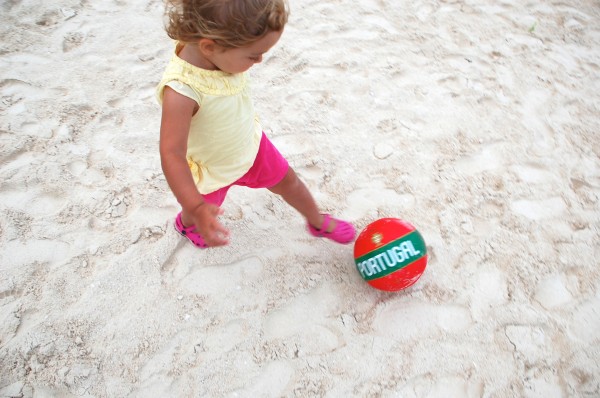
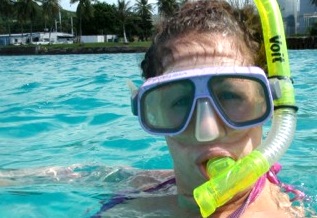 My sister: Now a master diver who’s also working toward her ship captain license
My sister: Now a master diver who’s also working toward her ship captain license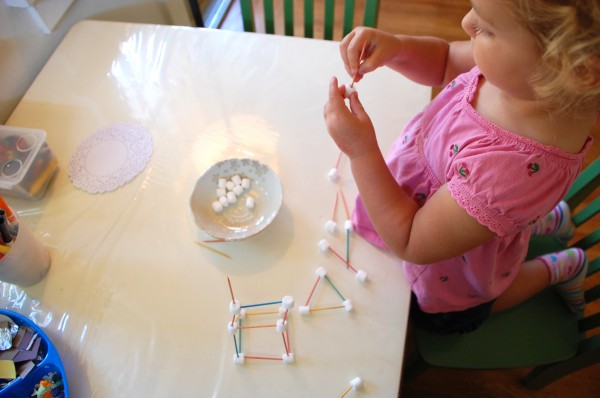

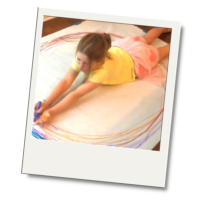
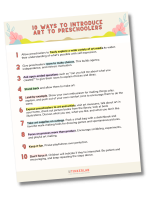
Great idea! I’ll start tomorrow. 🙂 You are so right that interests are fleeting, and I often forget myself from one day to the next what Max did, so documenting might begin to bring some objectivity and consistency to the whole process. p.s. I was super interested in ice skating as a child too and had a 8am math class in college. Alas, no scooter ride with a cute boy!
Cool — I’m so glad to have your company on this project! It’ll be interesting to see what comes of it. And what’s up with 8 am college classes, regardless of the topic? College administrators were once students, right?
I love this idea & am interested to see what each of my kids is drawn to without a push from mom.
As I muse over this project, it appears inevitable that mom will no doubt have some influence, regardless of an intention of remaining completely objective. The other day my two year old spent half an hour playing with ice cubes, ice cube tongs and a bucket, which she LOVED, but would have never played with in the first place had I not brought her the materials. It’s an interesting conundrum for me at this young age, and it might be a different story for older children?
I love this idea too and will do some documenting myself. I try to give JD many options to gravitate toward (playdoh, pots and pans, markers, crayons, Aquadoodle, Legos, stickers, as some examples), but he’s never really focused on one thing for an extended period of time, usually jumping from one thing to the next and leaving a path of destruction behind him 🙂
Since our kids are the same age, I’m interested to hear what you discover. I think this plan is a little more challenging with 2 year olds (than older kids) since they’re developmentally more flighty. And you’re right to give JD multiple options because children wouldn’t even know where to begin without knowing what’s available to them…especially at such a young age. Hmmm…looks like I have ideas for another post brewing 🙂
I’m excited to challenge myself this week with documenting. I definitely agree we need more creativity in the mix at our home. And I get that it’s all up to me and what outlets I provide. Can’t wait to share. Thanks Rachelle
Hi Grace! I’m glad you’re joining me. It’ll be fun to see what RoRo gravitates to!
Hi Rac.
Yah. this is a tough one for our little ones. Their curiosity is at it’s hieght so most of what you throw at them is interesting. It makes me stop to imagine the joy if someone as creative and motivated as you and I kept a stream of activities awaiting us….imagine what a perfect life that would be. “Here you go danielle. I set up this activity for you.” My insides would explode with joy and the thought of another activity ready for me when i was done this one – well, I just might faint out of gratitude.
In seriousness, I noticed Simone’s interests are development driven. Right now it’s dress-up, babies and stylist. There is also scooting, puzzles, gluing, drawing, making soup with anything she can find. Oh and ice ream eating!!!
There is no end to what they will try, which is why i love your blog. When i run out of ideas – i come to you.
You brought a huge smile to my face with the thought of someone setting up activities for me all day long…and cleaning up after me too, of course! And you’re so right about interests being development-driven too, and I’m hesitant to put too much weight into any particular interest given that these things can change so quickly with age, the introduction of novel ideas, peer interests, travel, etc. And OMG, if I allowed myself to follow N’s interest in cupcakes, well, we’d never peel ourselves away from the bakery!
Your mission of documenting passion brings me back to my days of teaching in a Reggio Emilia-inspired school. We documented the learning moments of the students and reflected on their daily activities to find trends in their play choices. We provided some open free play time to explore as well as more structured time where activities we planned supported their current trends in play. Toys and books were rotated out of the play space to do two things: 1) support their current interests and 2)provide variety so they didn’t get bored. I found myself asking a lot of questions while the students were playing and exploring. Why did you do that? Would the same thing happen if you did this? All of my questions were more open-ended and I tried to approach the students as if I were researching rather than teaching. I didn’t want to have a predetermined learning outcome. I just wanted to plant a seed to see where they went with something. While creating a learning environment that supports their interests, children do need to be exposed to new and varied experiences. Then when their interest wains from one thing, you’ll have inspiration for the next collection of toys, activities, and books. I love this blog Rachelle! Although I don’t have children of my own, it keeps me thinking and reflecting as a teacher. Lori
Hi Lori! Thanks for chiming in. Although I’ve known about Reggio Emilia schools since graduate school, it wasn’t until I had my own child that I’ve become addicted to learning as much as I can about them. Unfortunately, the closest Reggio school is about 20 miles away from us. I love the questions you asked the kids, and wholly agree that it’s important to keep activities fresh while simultaneously paying attention to interests. The balance between free play and structured activities, as you say, seems to be key to keeping up with kids’ interests. As an aside, I’ve been throwing a lot of “Why” questions at my daughter lately, and I think she’s getting annoyed because her rote response has become “Mommy, you tell me.” *Sigh*
I’m glad to hear that this site is inspiring on the teacher-level too. I guess my own roots as an educator will always be a big lens through which I’ll parent, and my hope is that there will be nuggets of goodness in all of this for anyone who interacts with children.
“What does she gravitate toward?” This is such a simple yet powerful and brilliant question. I cannot wait to start really watching my daughter when we are doing our daily activities to see what parts she is really drawn to. Thanks for the great inspiration.
Hi Abbie! I’m so glad you’re joining us. Please keep me posted on your own observation adventure.
I totally love this endeavor! Will be starting this with my kids too 🙂 thanks for being an inspiration!
I blogged about this at http://visiblyengaged.com/2012/11/02/documenting-engagement/
warm regards,
Lana
Awesome! Its actually remarkable paragraph, I have got much clear idea
regarding from this piece of writing.